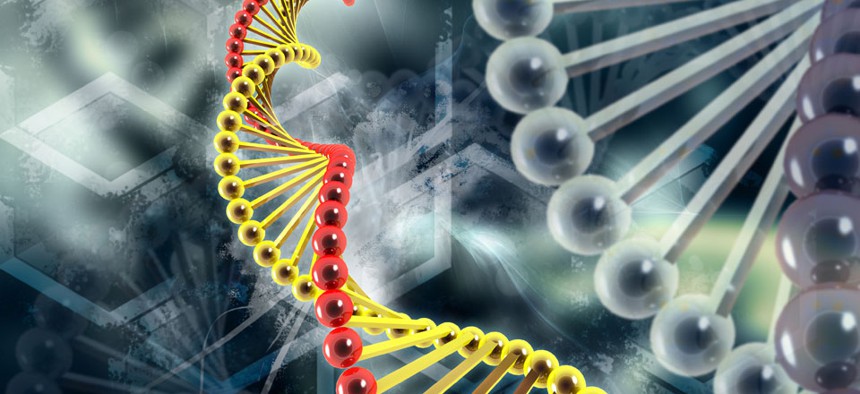The U.S. Has a Huge Backlog of Untested DNA Evidence

dream designs/Shutterstock.com
And the Supreme Court might have made it worse.
Supreme Court Justice Samuel Alito called it "the most important criminal procedure case that this court has heard in decades." But for now, the Court's decision in the Maryland v. King case—regarding whether police can swab your cheeks for DNA during booking—may be functionally irrelevant. The nation doesn't have a genetic-processing apparatus in place to deal with the current overload of DNA samples. There's a massive backlog of biological evidence in crime labs, and efforts to combat that backlog in recent years have failed.
In the case, the majority reasoned your DNA is like a fingerprint—used to maintain identity—rather than a piece of personal information, which would require a search warrant. In a 5-4 decision, the Court maintained in Maryland v. King that it is OK for police to take a swab of a person's cheek cells after that person is booked for a crime, and that it is also OK if that DNA swab implicates the person in custody in a cold case.
In the future, this ruling will be very significant. On the technological horizon are machines that can analyze a sample in 90 minutes. Police will be able to connect the dots between perpetrator and crime with a fluid ease (which frightens some civil-liberties advocates).
But that's the future. Here's the reality.
"The demand for DNA testing continues to exceed the capacity of laboratories to process these samples," a July report from the Government Accountability Office states. This is despite the $100 million a year the federal government provides each year with the specific purpose of reducing such backlogs.
GAO reports that this is due to the increased use of DNA evidence in criminal cases and the fact that now 29 states routinely take DNA swabs of those caught up in the criminal justice system. Also included in the backlog are DNA tests for things like bloodstains at a crime scene and rape kits—pieces of evidence that could be used to convict criminals or exonerate the innocent. In 2011, there was a 91,000-case backlog at the end of the year. With increased adoption of routine cheek swabs, this is likely to get worse.
The Justice Department knows the backlog has been growing, as seen in the chart below from a 2010 report from the National Institute of Justice.
While we keep throwing money at the problem, the accountability doesn't find clear evidence that it has been at all effective. Sixty-four percent of all money spent on DNA forensics goes to combat the backlog.
It's not the case that police departments are flooding the testing centers with every piece of evidence that comes their way. According to the DOJ report, "14 percent of unsolved homicide cases (an estimated 3,975 cases) and 18 percent of unsolved rape cases (an estimated 27,595 cases) contained forensic evidence that was not submitted by law enforcement agencies to a crime laboratory for analysis." But there are doubts that the system could handle these cases if they were submitted. The report continues: "Submitting untested evidence in law enforcement custody for analysis could have a serious impact on DNA backlogs in crime laboratories if the evidence were suddenly submitted to a crime laboratory all at once."
So, the system is at a saturation point. GAO calls for a review of how effective the federal dollars are in reducing the backlog, and for a reassessment of performance data because it is currently unclear what effect the funds are having. The Supreme Court's decision had an eye on the future, when the advances in technology will expedite the processing of biological evidence. But, for now, it might only clog the system further.
NEXT STORY: From a Tweet to a Thunderclap








